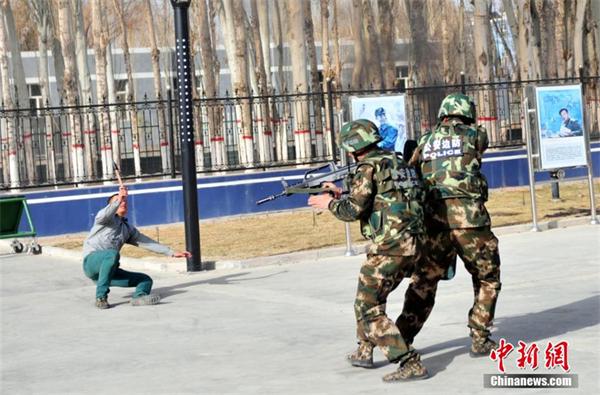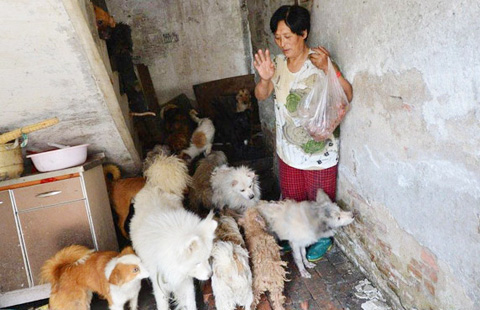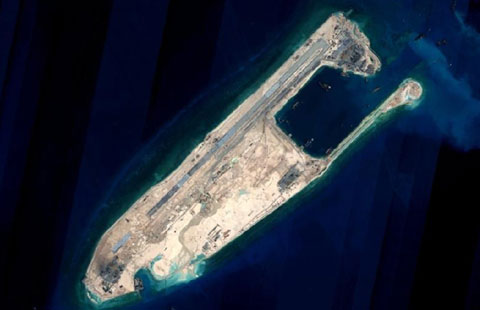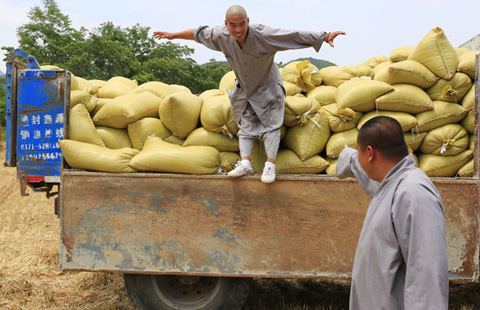Lies and false hopes entrap Xinjiangers
Updated: 2015-06-18 07:42
By Cui Jia and He Na(China Daily)
|
||||||||
International terrorist organizations are subverting traditional practices and forcing people from the Xinjiang Uygur autonomous region to fight in a worldwide jihad, before sending them home to carry out more attacks, as Cui Jia reports from Urumqi and He Na from Nanning, the Guangxi Zhuang autonomous region.
 |
|
Police attending an anti-terror drill aim at a suspect at a border police station Xinjiang in this April, 2014 file photo. [Photo/Chinanews.com] |
Meturdi Iminiaz, from the city of Hotan in the Xinjiang Uygur autonomous region, simply couldn't shake the image of a member of an overseas terrorist cell forcing a small boy to fire a pistol. "I can't believe anyone would put their children through such a thing. Those children will be scared for life," the mother of two said.
She had just watched video clips filmed by Xinjiang natives who had smuggled themselves and even their families across the border to join international terrorist groups and carry out a "holy war".
The clips were shown in a documentary that recently aired on Xinjiang TV and included rare footage of children being groomed to become killing machines. The program also contained interviews with suspected terrorists from Xinjiang who had been detained overseas and then deported back to China.
The 6-year-old boy in the video eventually pulled the trigger with the assistance of his father Azat Rozahong. The clips, filmed at a terrorist training camp near China's border with Afghanistan and Pakistan, showed the bullet hitting a tree. The footage was filmed by the boy's mother.
"I didn't feel a thing at the time. When I look back now, it's painful to see my children suffering," Azat Rozahong said in the documentary. He and his wife are now being held at a detention center in Xinjiang.
'Migration'
The road along which Azat led his wife and children is called yijilate, which means "migration" in the Uygur language. The concept has been transformed into a movement by religious extremists who urge people to leave their homes and carry out holy war overseas.
"Many terrorist organizations use the concept of yijilate to recruit people from other countries to fight for them. They have established human-trafficking chains to help people to leave their home countries illegally," said Yang Shu, director of the Central Asia Studies Center at Lanzhou University in Gansu province, who studies international terrorism.
The yijilate movement began to penetrate Xinjiang, a predominantly Muslim region, in the late 1980s and early 1990s, but it wasn't until 1996 that the authorities noticed a surge in the number of people crossing the border illegally to join international terrorist groups, he said.
According to the Xinjiang police, 90 percent of terrorist attacks carried out in the region are connected with yijilate or are conducted by terrorist cells to promote the notion that people should carry out attacks at home if they are unable to leave the country.
Some of the cells in Xinjiang are run by terrorists who trained overseas before returning to wage war in their own country. In March, Zhang Chunxian, Xinjiang's top official, said some local residents have crossed the border illegally to join the Islamic State, or ISIS, the terrorist organization that has seized large areas of eastern Syria and northern and western Iraq and declared a caliphate. Zhang added that the Xinjiang authorities had also destroyed a terrorist cell run by returnees who had fought with ISIS.
 Warriors beat Cavaliers to clinch NBA title
Warriors beat Cavaliers to clinch NBA title
 Saving dogs from dog meat carnival
Saving dogs from dog meat carnival
 Ten photos you don't wanna miss - June 17
Ten photos you don't wanna miss - June 17
 Race-goers get ahead with hats
Race-goers get ahead with hats
 Top 10 most valuable auto brands in the world
Top 10 most valuable auto brands in the world
 Ten photos you don't wanna miss - June 16
Ten photos you don't wanna miss - June 16
 Shaolin monks harvest bumper crop
Shaolin monks harvest bumper crop
 Cambridge students mark end of exam with boat race
Cambridge students mark end of exam with boat race
Most Viewed
Editor's Picks

|

|

|

|

|

|
Today's Top News
Gunman kills nine people in South Carolina church shooting
US House moves to revive Obama's Pacific trade pact
Hong Kong lawmakers reject election reform proposal
Lies and false hopes entrap Xinjiangers
China's economic strategy focus of panel
UN strategy for long term
topic of debate
Donald Trump announces bid for
US presidency
Vote to begin on Hong Kong's election reform
US Weekly

|

|





